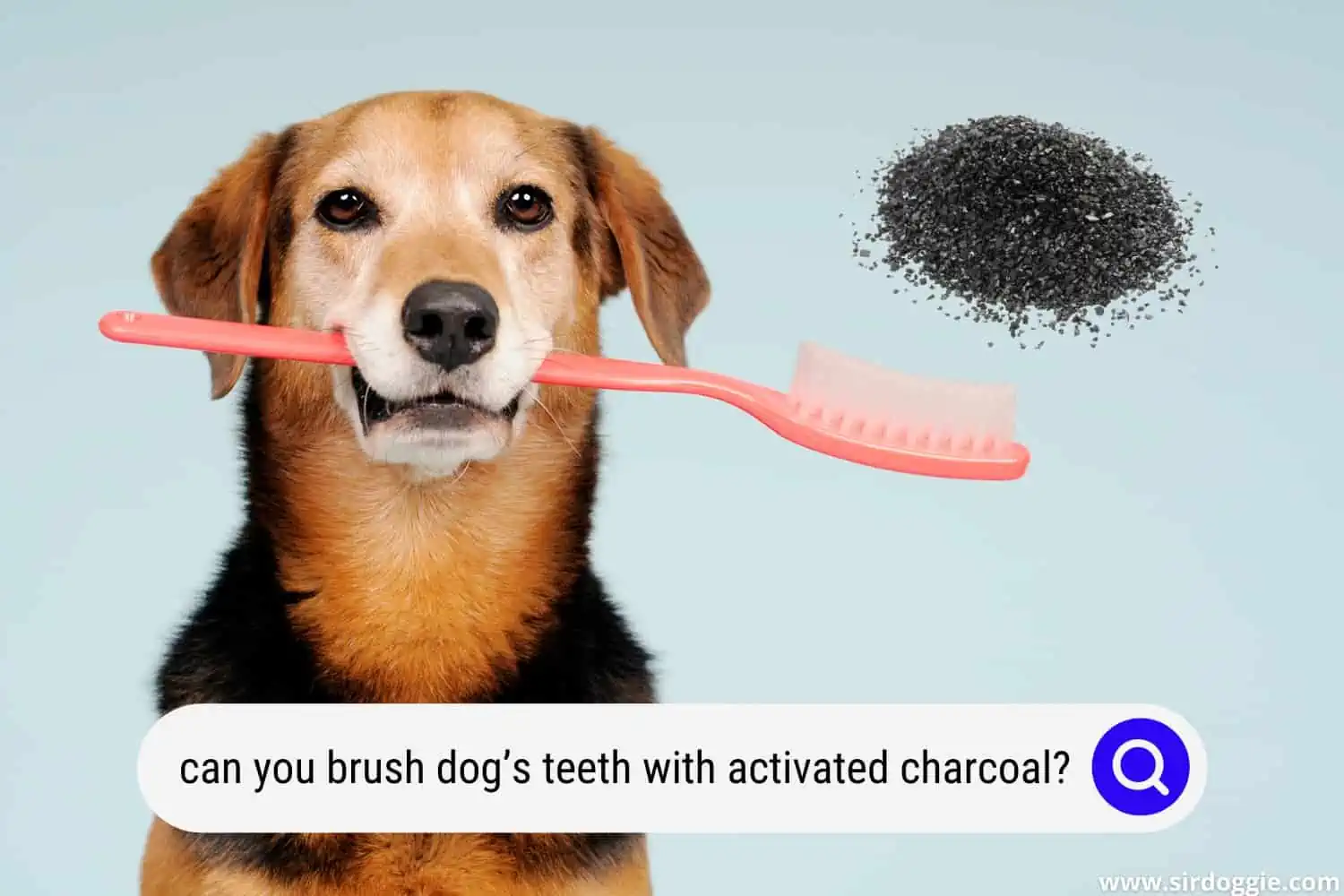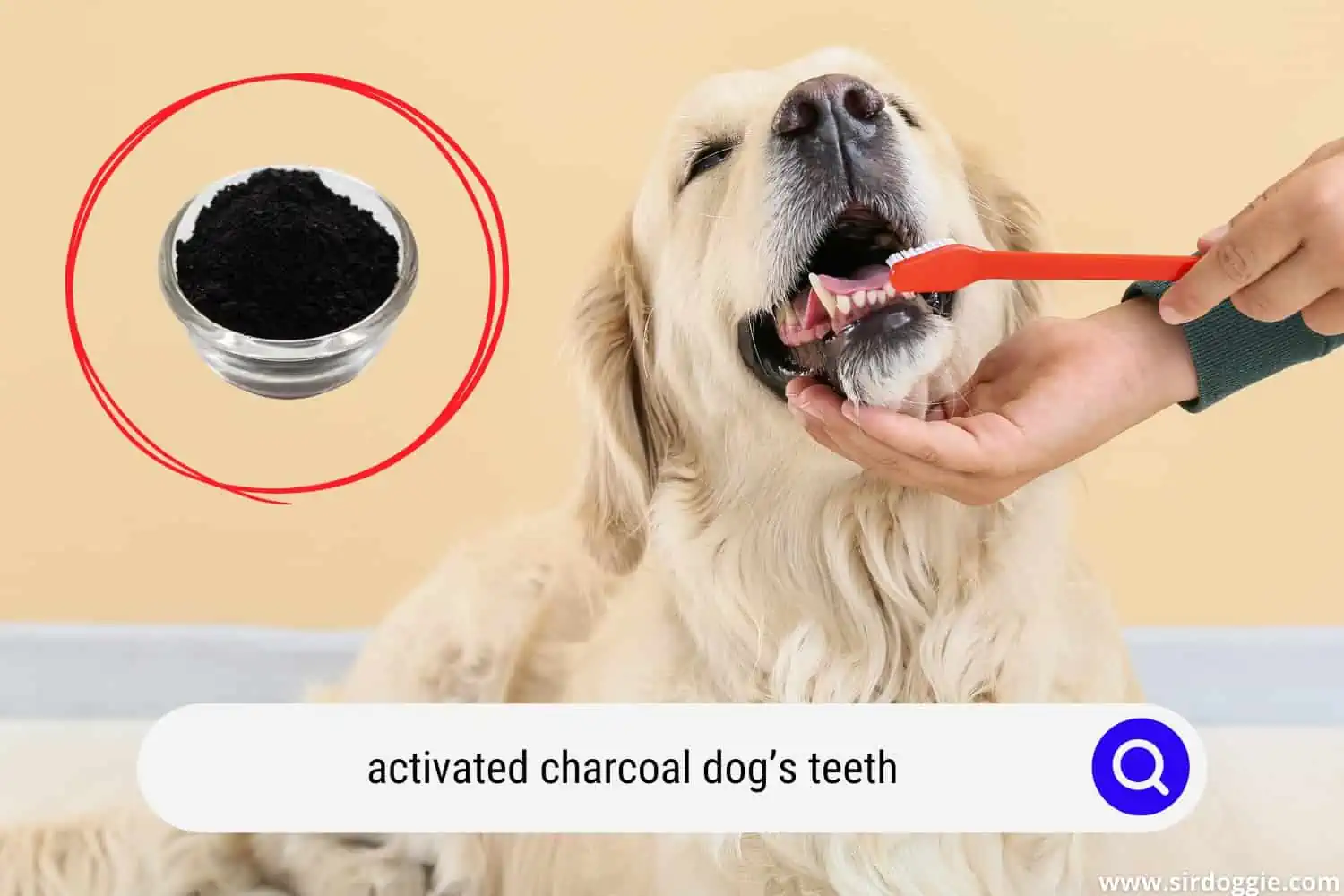Can I Brush My Dog’s Teeth With Activated Charcoal? [SAFE?]
Brushing your dog’s teeth regularly is an essential part of their overall dental care. Bad breath is not just a problem for humans; dogs can also have bad breath, usually due to poor oral hygiene.
You might be wondering if brushing your dog’s teeth with activated charcoal is safe and effective. Well, the answer is mixed!
Activated charcoal has become an exciting new health trend for both the dietary and dental health of dogs. This material is porous enough to absorb certain toxins. Activated charcoal does not harm and soaks up toxins and poison.

Related Reading: How to Brush Small Dog’s Teeth
Is Activated Charcoal Safe for Pets?
The safety of activated charcoal depends on the type of activated charcoal used in the product and how you use it on your dog.
Activated charcoal is considered a “universal antidote.” This is because it is effective against most kinds of toxins. It can reduce toxins by 80 percent in just 3 hours! It is safe for pets but only when recommended by a vet. If in doubt, you should always ask your vet first and indicate what specific product you will be using.
Activated charcoal is among the latest teeth whitening methods/crazes used for both humans and pets out there. When it is put in canine toothpaste, it’s intended to whiten your dog’s teeth. The charcoal is used to lift stains from your dog’s teeth and make them look brighter and whiter. Some people just use activated charcoal powder for their dog’s teeth. This is very similar to its use for humans (you have probably seen the viral videos of people with black teeth as they brush)!
Before the charcoal whitening craze, vets used activated charcoal to remove toxins from the dogs’ stomach when having to pump their stomachs after toxin ingestion. It has numerous uses and benefits to dogs but teeth whitening isn’t one of them.
Keep in mind that activated charcoal is not recommended for every dog’s teeth or every case of poisoning.
Benefits of Activated Charcoal for Your Dog’s Teeth
Activated charcoal helps to maintain healthy teeth and gums. Here are some of the benefits of activated charcoal for your dog’s teeth:
- It helps remove surface stains on the teeth
Activated charcoal is a highly absorbent substance that binds with many types of stains. It wears the stains off your dog’s teeth. Activated charcoal is made out of fine, abrasive grains that help to absorb surface stains to some degree.
- It improves bad breath
It also acts as a breath freshener for dogs and leaves the mouth fresh and clean. It fights bad breath with antibacterial properties. Activated charcoal is a good ingredient to add to your dog’s teeth cleaning regime.
- It’s your dog’s natural teeth whitening tool
Activated charcoal acts as a natural tooth whitening ingredient for dogs. It helps to clean and whiten your dog’s teeth. Activated charcoal naturally whitens teeth and will draw out toxins and bacteria from the mouth.
Quick note: There is no clinical evidence that proves that activated charcoal has a natural whitening effect on your dog’s teeth or any effect on stains below a tooth’s enamel.
Some Concerns about Using Activated Charcoal
The cons of using activated charcoal include:
- Activated charcoal is abrasive and may wear down tooth enamel. It can cut through the plaque and then start wearing down the enamel on your dog’s teeth. Without enamel, your dog’s teeth will become vulnerable to cavities and sensitivity to temperature changes.
- There are no studies that show that activated charcoal removes stains below the enamel.
- The truth is, that all abrasive products are dangerous for your dog’s teeth to some extent. Everyday use of activated charcoal might cause tooth sensitivity.
- The long-term effects and safety of activated charcoal are still not known.
Most vets and dentists warn against using abrasive substances, like activated charcoal, for teeth cleaning. This is because they can lead to permanent enamel thinning and teeth sensitivity.
Pet Parent Tip: Speak to your vet before brushing your dog’s teeth with activated charcoal.
How Often Should You Brush with Activated Charcoal?
It’s ideal to brush your dog’s teeth daily. But with activated charcoal, brush your dog’s teeth no more than three times a week. Daily use can be very harsh for teeth. You should brush your dog’s teeth with activated charcoal for roughly 2-3 minutes.
If you do decide to use activated charcoal for your dog’s teeth (after checking with your vet of course), use it only in moderation. Activated charcoal is abrasive and shouldn’t be used long term. With excessive use, it can erode your dog’s vital tooth enamel.
For many dogs, teeth brushing becomes a part of their daily routine. They will begin to expect to brush and enjoy it. If you don’t have time for daily brushing, do it at least once a week, though the more often the better.
Tips for Brushing Your Dog’s Teeth
Establishing an at-home dental care routine is an important part of your dog’s overall health. Regular brushing is the best thing you can do to keep your dog’s mouth in good condition.
Here are some useful tips for a great tooth brushing experience.
- Puppies learn and pick up new things faster. Start tooth brushing in puppyhood as it’s a good habit to get into early.
- Get your dog used to you touching their mouth and teeth and toothbrushing.
- Pick a time that suits your daily routine. It doesn’t matter when you brush their teeth, just try to keep it consistent.
- Start with the front teeth and then work your way back to the molars. Try a few teeth at a time. Over time, your dog will become comfortable enough for you to do the entire mouth.
- Keep each brushing session short and sweet. It should be no more than a couple of minutes.
- Every dog is different. So, train at a pace that suits you and your dog.
- Try to make brushing an enjoyable experience. Give lots of praise and a reward but only for good behavior.
- Take care when putting your fingers into your dog’s mouth. We don’t recommend doing so if your dog is likely to become aggressive.
- Be sure to purchase canine-specific toothbrushes and toothpaste. The pH level in a dog’s mouth is very different from the pH level in a human’s mouth and human toothbrushes and toothpaste will not be appropriate for your dog.
We hope these tips will help make brushing your dog’s teeth an enjoyable experience for everyone.
Why is it so Important to Brush My Dog’s Teeth Anyways?
Dental health is crucial for everybody, even dogs! Regular brushing by a dog-specific toothpaste and toothbrush is by far the most effective way to maintain good oral hygiene in dogs. Regular brushing will help to:
- Remove bacteria and tartar buildup
- Prevent inflammation of the gums and other gum diseases
- Prevent painful cavities
- Protect teeth from becoming loose and falling out
- Keep breath fresh
Alongside brushing, there are other ways to help keep your dog’s teeth clean and healthy:
- Dental chews
- Toys
- Kibble
- Uncooked bones
- Natural dental sprays
- Coconut oil
Pet Parent Tip: Avoid giving hard chews, cooked bones that can splinter, or stones to your dogs. They can wear down or break teeth. When starting any new product (like charcoal tooth brushing) it’s always best to talk to your vet and get recommendations.

Final Thoughts
It is vital to maintain your dog’s dental health. As you can imagine, a dog whose teeth are not well maintained is subject to a lot of discomfort and possible abscesses and missing teeth, leading to difficulty eating in old age. Regular tooth brushing is not just for humans; make sure you make it part of your dog’s grooming routine too!
Although brushing your dog’s teeth with activated charcoal is getting a lot of attention and press, its safety in long-term use is still unknown due to limited studies. There’s a lot of room for research on the effectiveness of activated charcoal on a dog’s teeth.
With a little daily attention to oral care from puppyhood, your fur buddy can have healthy teeth for a lifetime. When you take care of your dog’s oral hygiene, you’re helping to take care of their entire body. The earlier you instill good oral care habits in your dogs, the better it is for your dog.
Speak to your vet about the best whitening option for your fur buddy. If you have any questions, feel free to message me!

Family Dog Expert Author
Hi there! I’m Stuart, a devoted dog lover and family dog expert with over a decade of experience working with our furry companions. My passion for dogs drives me to share my knowledge and expertise, helping families build strong, loving bonds with their four-legged friends. When I’m not writing for SirDoggie, you’ll find me hiking, playing with my beautiful dog, or studying music.